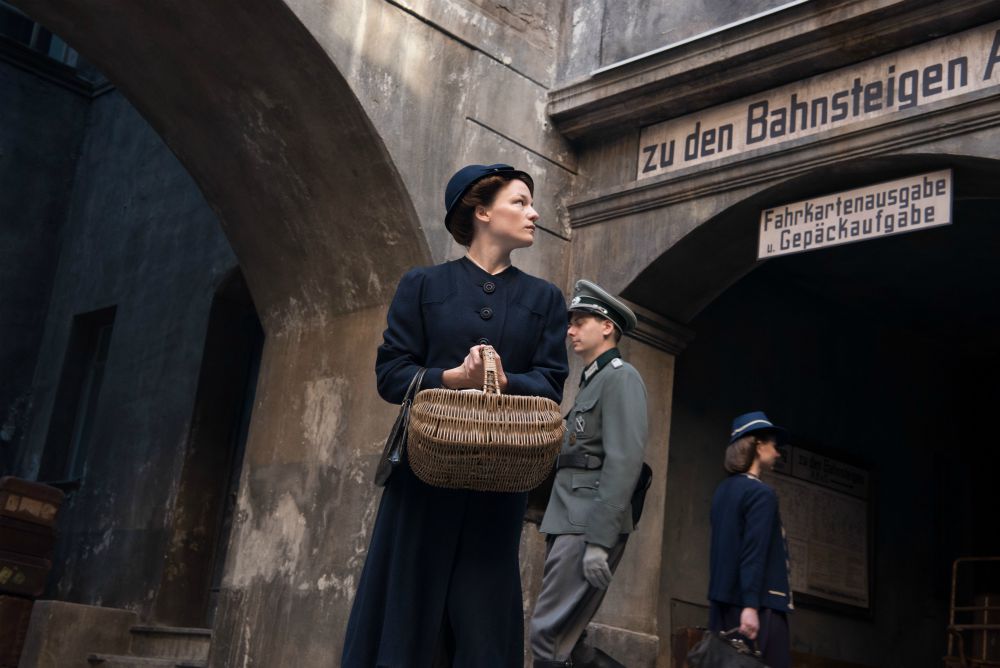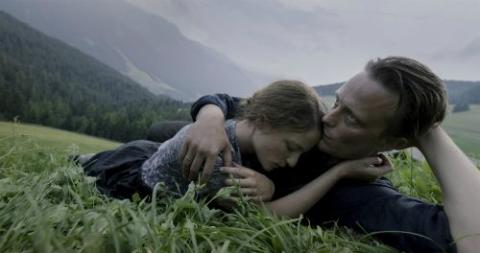
Valerie Pachner in the film "A Hidden Life" (Twentieth Century Fox Film/Reiner Bajo)
"A Hidden Life," released Dec. 13 in theatres, is a contemplative kind of biopic of Austrian conscientious objector Franz Jägerstätter (1907-1943). He has now been beatified by the Catholic Church, but Terrence Malick's film is not about a man who becomes a statue on the altar; he avoids hagiography at every turn. Instead, the film's focus is on the inner journey of a man and wife, and ultimately the man himself, who makes an almost unthinkably difficult choice and finds true freedom by following his conscience.
Following is an interview with actress Valerie Pachner, who plays Jägerstätter's wife, Franziska, in the film. The interview has been edited for length and clarity.
NCR: How did you become attached to "A Hidden Life"?
Pachner: Four years ago in July 2015, I responded to a casting call. I wanted the role, but I didn't have any scenes prepared. They gave me one of the letters [between Fani and Franz] to improvise. A few weeks later, I got the call.
Had you heard of Franz before?
I grew up about 50 to 60 kilometers from the village of St. Radegund, so I knew about him and his wife. It wasn't like people talked about him all the time, but his story and his world were very familiar to me.
Is St. Radegund really in the mountains as the film portrays?
The village is in a hilly location rather than the mountains as shown in the film, but we did film some scenes in the bedroom of the actual farmhouse for two days where they lived.
You showed the film to the three daughters of Franz and Fani [Rosalia, Maria and Aloisa] shortly before the film premiered in Cannes in May. What was that like? Was Hildegard [his older daughter with another woman before he married] there, too?
I showed the film to their three daughters who still live in the area. Hilde was not there. I remain friends with Maria, whom I met on the two-day shoot at their family farmhouse. They don't speak English, so Terry [Malick] asked me to show them the film so I could translate it. One of the film's producers, an editor, and a priest friend was there, too. I sat on the couch together with the sisters in Maria's house and we watched it.
How did they respond to the film?
They were so moved. They cried. The obviously felt the pain of loss, but because it is more than a narrative film, really a meditation on his life, this made them connect with it. They did like my portrayal of their mother. They agreed that we got it right, and this was very important to Terry that they thought we got it right.

Valerie Pachner and August Diehl in the film "A Hidden Life" (Twentieth Century Fox Film/Reiner Bajo)
What else did the daughters share with you about their parents?
Where I grew up, we thought about Franz in a negative way. But in the 1980s, when his reputation was reinstated, when the church changed its view of him, the public changed its view of him. It was very hard for the daughters when they were growing up. When they got married, their mother, Fani, told them, "It is good that your name is changed now, that it is not Jägerstätter" because the community thought that Franz was crazy for doing for what he did. Fani and her daughters carried a lot of weight over the years. To think that after the war she was alone to carry that burden.
Did playing Fani in this film change you in any way?
I would say yes. Trying to get close to a character, the idea of someone who feels that to stand up for what is right because is the right thing to do, even if you go through a lot of pain; to put morals above your needs or the body's instincts to survive, it very powerful.
To go through that journey, you get to the point that you feel this is right, you realize what is right; you know it and don't compromise yourself: It empowers you, and you realize what human beings are capable of.
Advertisement
It changed me, not that I went through what Fani went through, but the idea of what she endured. It lets you imagine other situations or moments in your own life. It gives you so much strength; it gives me something to hold onto when I have a difficult decision to make. I ask myself, is this something everyone is doing, or should be doing? Or is it the train of greed, of fast success? It keeps you from jumping on this train or another as it speeds by.
Was there one particular part of the film that impressed you more than the others?
To see the love of their togetherness, that you live something like this, that you do it with someone, not alone, but together, you feel strong, unstoppable. I felt that their love was stronger than death and pain. Their love gave me strength and hope.
[Sr. Rose Pacatte, a member of the Daughters of St. Paul, is the founding director of the Pauline Center for Media Studies in Los Angeles.]







